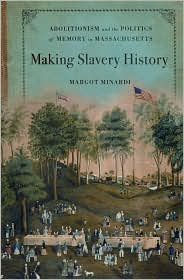 Margot Minardi is Assistant Professor of History and Humanities at Reed College.
Margot Minardi is Assistant Professor of History and Humanities at Reed College.Her new book is Making Slavery History: Abolitionism and the Politics of Memory in Massachusetts.
About a week ago I asked her what she was reading. Her reply:
My recent reading has been unintentionally Anglophilic. I’m currently reading Julian Barnes’s novel Arthur and George, which interweaves the biographies of two Britons from the turn of the last century: Arthur Conan Doyle, author of the Sherlock Holmes stories, and George Edalji, a lawyer of Scottish and Indian ancestry who was jailed for three years following a wrongful conviction for murdering farm animals. Some academic historians despise historical fiction, but I am definitely in the camp of those who think that novelists often get at the truths of history better than historians do themselves. My book, Making Slavery History, actually quotes a line I absolutely love from Barnes’s Flaubert’sLearn more about Making Slavery History at the Oxford University Press website.Parrot: “the past is autobiographical fiction pretending to be a parliamentary report.” I love the way that good historical fiction can explore not just the “what happened” of the past but also why the telling of it is meaningful.
While I am enjoying Arthur and George so far, it sometimes feels a little too historical. It’s clear from a peek at the Author’s Note that Barnes did formidable research—even quoting from actual letters in the course of his narrative—and his reconstruction of the lives and times of Doyle and Edalji is meticulous. I don’t get the sense of Barnes playing with history, memory, and narration in the way that he does in, say, A History of the World in 10½ Chapters. I was also surprised that the two protagonists don’t come into contact with each other until page 257, but as I read on, the connections between these two men, each deeply committed to his own distinctive ideal of Englishness, are becoming more and more interesting. I am eager to see how this historical detective story plays out.
The book I read this summer that I’m currently recommending to everyone I meet is Andrea Wulf’s The Brother Gardeners: Botany, Empire, and the Birth of an Obsession, which traces how gardening became a national pastime in eighteenth-century England. As the British empire expanded, English plant collectors enjoyedaccess to novel botanical specimens from around the globe. How did English gardens lose the manicured formality of their continental counterparts and become the more lush and free-form refuges we know today? Why did proper English gentlemen reject Carolus Linnaeus’s system of botanical classification as thoroughly obscene? What did the famous mutiny on the Bounty have to do with botany? Wulf answers these questions and many others in this lively, erudite book. She roots her narrative in biography, exploring the connections among a group of collectors, adventurers, and scientists who all shared a love of plants. The author has a knack for drawing out colorful anecdotes and character traits, making this richly detailed book a pleasurable read for gardeners and non-gardeners alike.
--Marshal Zeringue




